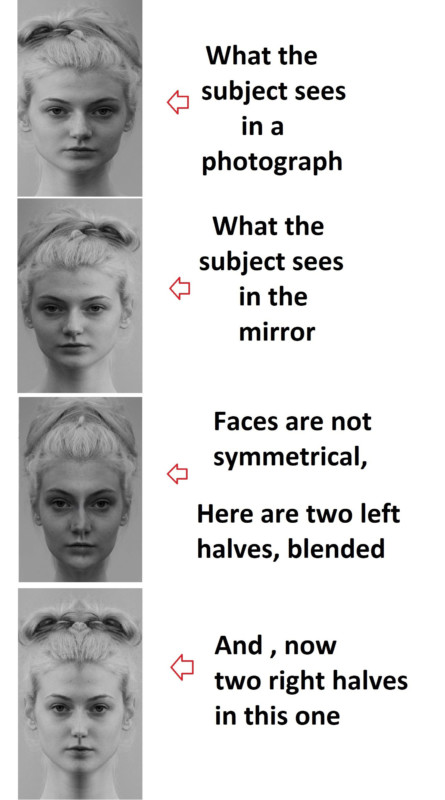Why People Don’t Like Portraits of Themselves
![]()
Portrait photos are often disliked by the subject themselves. From the early formative years of grade school on into the advanced years of adulthood, the feeling of dislike of your own picture is universal. Yet it is not for vanity sake, nor is it to spare the shock of another from seeing self-assumed horrors. Assuming you are neither a narcissist nor a person with flawless perfection, you may simply be like the rest of the human race: there is real science behind the reason why you may not like your own photograph.

The human mind looks for patterns — memory relies on pattern recognition and correlation. The face is the first thing we ever learn to recognize. A human infant scans their mother’s face and studies the details closely as one of the first visual/mental tasks to aid survival. We get so good at recognizing faces that we often can not stop assigning faces to objects that normally have no face. Face pareidolia is where one sees a face in almost anything that remotely suggests a face shape.
We admire beauty and shun the ugly. This action is a survival skill to ensure safety and good family lines. For the concept of beauty, most anything that is balanced in portion with a good symmetrical shape is considered visually pleasing to almost anyone.
Yet, almost every human face is not perfectly symmetrical. Even though it can be very close with some, one side is not the exact copy of the other.
We are used to seeing the literal mirror version of our own image on a daily basis. Our self-identity fixed into our mind relies on an image that is flipped left for right, backward to what anyone else sees of us when they look at us.
When confronted with a photo of ourselves, it looks wrong because it is a mirror image from what we have grown so accustomed to seeing. Even this small difference makes an unsettling feeling that something is wrong. It triggers the same fight or flight response as if something is trying to trick you.
After all these years, that reflective accuser hanging on the wall has had a laugh at all of us. Perhaps watching us age or gain weight and then showing it to us. When you do look into the mirror, compare that image to your photo. Let science give you some sense of confidence. You are you, and that’s all that matters.
About the author: Eric London is a gunsmith based in southeast Georgia. The opinions expressed in this article are solely those of the author. London previously worked as a technician in a darkroom for a small town weekly newspaper.